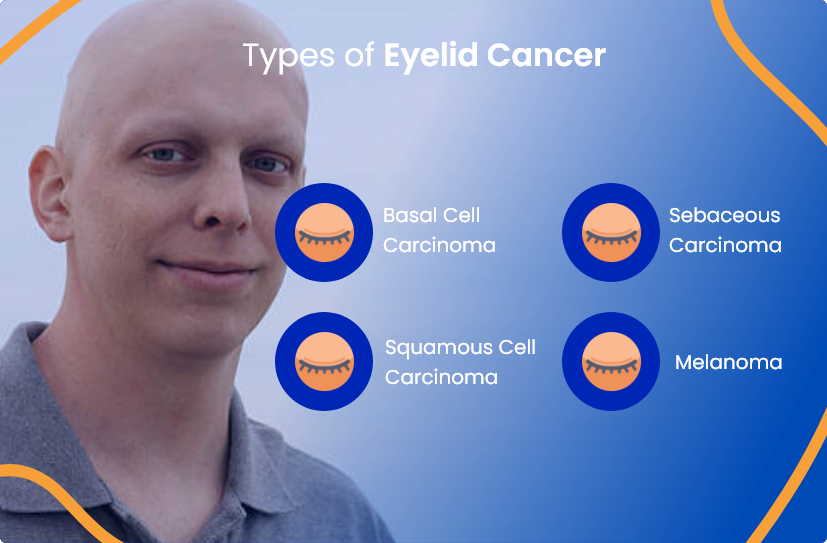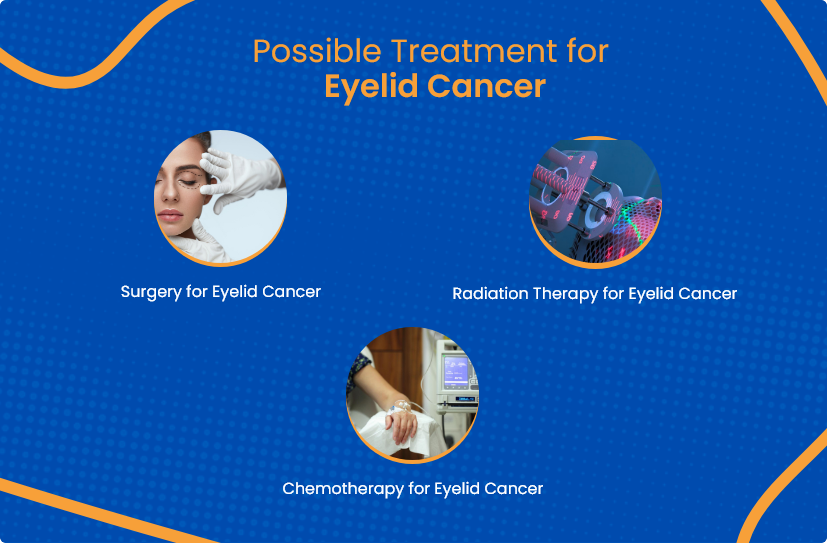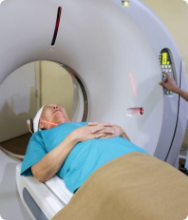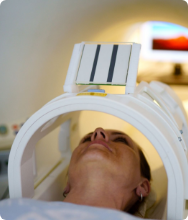
Book a Consultation
Thank you!
Your form has been sent successfully.

Eyelid cancer starts in the epithelial layer of the skin of the eyelid, which is fragile and sensitive to sun exposure. This type of cancer occurs when sebaceous (fat), sweat, or apocrine gland cells multiply and grow uncontrollably.
According to the American Society of Clinical Oncology, the different types of eyelid cancers are as follows:

It starts in the round (basal) cells of eyelid skin. Basal cell carcinoma is the most common type that usually occurs in the lower eyelid.
It is an aggressive form of cancer that occurs on the upper eyelid. It is the second most common form of eyelid cancer, which may start from the sebaceous gland that secretes lubricant in the eye.
It starts in the keratin-producing layer of the skin of the eyelid. It spreads quickly to nearby organs.
Melanoma is a rare form that starts from the melanin-producing cells of the skin, called melanocytes.
Common signs and symptoms of eyelid tumor may include:
 Change in the eyelid's appearance
Change in the eyelid's appearance
 Swelling of eyelid
Swelling of eyelid
 Unhealed ulcer on the eyelid
Unhealed ulcer on the eyelid
 Thickening of the eyelid
Thickening of the eyelid
 Spreading discoloration of the eyelid
Spreading discoloration of the eyelid
Eyelid cancer treatment options depend on the type and stage of the disease and the patient's overall health.

Ophthalmologists (eye surgeons) surgically remove the tumor with some surrounding healthy tissue. It is the most common treatment for eyelid cancer. The extent of surgical removal depends on the size and spread of the disease.
This therapy uses high-energy radiation to kill cancerous cells to treat eyelid cancer. Radiation can be delivered via an external machine outside of the body, called external beam radiotherapy.
Chemotherapy uses systemic anti-cancer drugs, which enter the bloodstream and reach and destroy rapidly growing cancerous cells.
Various methods are used for a definitive eyelid cancer diagnosis after considering the patient's symptoms, age, and general health.

A small sample of tissue is removed for microscopic examination. Sometimes, the entire tumor may be removed through biopsy.

CT scan is a series of X-ray images from different angles that form 3-dimensional, cross-sectional images of tissues, which helps to identify abnormalities in tissues and measure the tumor's size.

MRI uses strong magnetic waves to take multiple detailed computerized tumor images. It helps to determine the size and exact location of cancer.

PET is a nuclear-medicine diagnostic procedure where a small radioactive substance is injected into the body, mainly absorbed by cancerous cells. PET then produces the image of the tumor by detecting this substance.

The non-invasive technology uses high-energy sound waves to produce images of eyelid tumors and lesions that may be invisible to naked eyes.
The oncologists at ACTC, Florida, are dedicated to providing exceptional patient care by prescribing effective, personalized, and evidence-based treatment plans. We strive to establish a positive environment for patients and their families throughout their cancer journey focusing on physical and mental health simultaneously. We have some of the most accomplished cancer specialists working on our team who believe in providing undivided attention to every patient’s needs.
The following are our providers who you can consult at ACTC:

Hematology/Oncology

Hematology/Oncology

Radiation Oncology

If you or a loved one has been diagnosed with eyelid cancer, a detailed discussion with your primary physician will help you understand your condition better. Your doctor can then refer you to an advanced specialty center such as ACTC in Florida.
As one of Florida's best cancer centers, we understand how a cancer diagnosis and therapy impact a person's physical and emotional well-being. Therefore, we work hard to make patients and their families feel secure. We understand how imperative it is for you and your loved one to make informed choices and play an active part in your medical care. We at ACTC strive to support you at every step of diagnosis, staging, treatment, and long-term follow-up in one convenient location. Our cancer specialists are supported by qualified clinical staff with over two decades of experience and a reputation for providing personalized cancer treatment.
Schedule a consultation by calling
 352-345-4565
352-345-4565
Usually, eyelid cancers are painless. The most common symptom of eyelid cancer is new growth that leads to asymmetry in the eyelids.
Fair skin people are more likely to develop eyelid cancer than others. Immunocompromised people and those who have a history of radiation to face are also at greater risk.
ACTC is one of Florida's leading cancer specialty centers, which offers personalized and comprehensive cancer care in a modern, state-of-the-art facility close to home. You can schedule a consultation by calling 352-345-4565 or completing the online form at www.actchealth.com (we can give the link to the form here).
Schedule a consultation by calling
 352-345-4565
352-345-4565